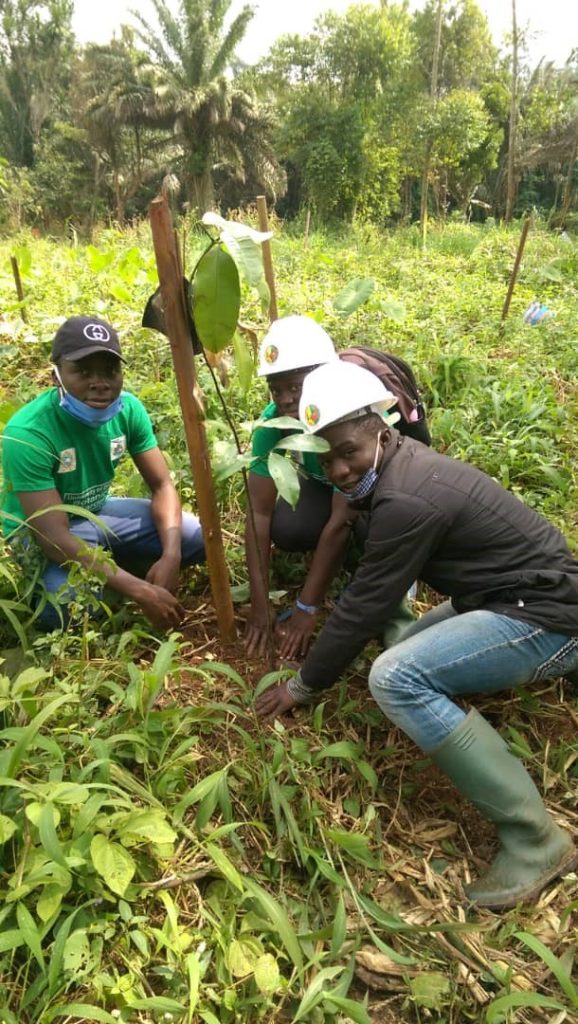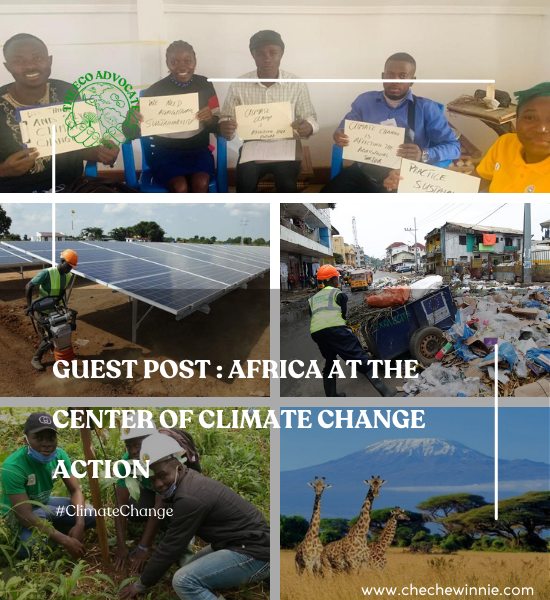
Africa is paying the highest price globally in terms of climate impact. As the least industrialized continent, Africa has contributed the least to climate change. However, it is the most vulnerable to the impact of climate change and the least able to respond. According to a recent report by the Mo Ibrahim Foundation, Africa has had the lowest per capita emissions of any world region every year since 1960. Between 1960 and 2020, Africa only accounted for 3.3% of global emissions. Asia, Europe and America have each emitted over 8 times the carbon of Africa. However, in Africa, temperatures are increasing faster than the global average and they are projected to continue during the rest of the 21st century and might rise faster than predicted if nothing is done. According to recent statistics, the increase in mean annual temperatures across the continent will exceed two degree Celsius and could rise as much as six degree Celsius before the end of the 21st century.
The widespread vulnerability of the African continent to the effects of climate change is also caused by pre-existing challenges, such as poverty, food insecurity, displacement and conflicts which have all contributed to creating hazardous leaving conditions thus leaving millions of people vulnerable and homeless hence, pushing them to settle in flood, landslide and drought exposed areas. Today, we talk of over 172 million persons directly affected by droughts, landslides, wildfires and floods. Without urgent action to redress climate change in Africa, the current vulnerability will only worsen, with an estimated additional 40 million people in sub-Saharan Africa pushed into extreme poverty and over 85 million people in the region migrating or being displaced, more than any other region in the world.
THE SOCIO-ECONOMIC ASPECT
Looking at the economic impact of climate change on the African continent, mention must be made of the fact that agriculture employs over 50% of the working population in most African countries so, a change in the climate should have a significant impact on African economies. The most climate-vulnerable countries are those that greatly depend on the agricultural sector for employment and livelihood. According to the Mo Ibrahim Foundation report, in eight of the ten most vulnerable countries –all in Africa- at least 60% of the working population is employed in the agricultural sector. In Niger and Somalia, the most vulnerable countries globally, the share of employment in agriculture is 72.5% and 80.3% respectively. The high level of informal unemployment in Africa poses an additional level of vulnerability to livelihoods as climate shocks disrupt jobs and the lack of insurance against risks prevents recovery of lost assets from climate-related events. Agriculture is critical to Africa’s economic growth and climate change could destabilize local markets, increase food insecurity, limit economic growth and increase risk for agriculture sector investors. African agriculture is particularly vulnerable to the impacts of climate change because it is heavily dependent on rainfall, and climate change has seriously affected rainfall throughout the continent. The Sahel is already hit by regular droughts and floods both of which kill crops and reduce yield. With temperatures expected to increase 1.5 times higher than the rest of the world, African countries will see shorter wet spells leading to droughts and thus low food production because they lack the necessary infrastructure and support systems present in wealthier nations. Southern Africa is expected to experience a 20% decrease in rainfall.
Rural areas are the most vulnerable to the effects of climate change but as we all know, when rural areas face crises, urban areas are also affected due to rural-urban migration and according to a recent report by the United Nations, more than half of the world’s population live in urban areas. Africa is facing the world’s fastest rate of urbanization. The current rate of people living in urban areas is 40% and is expected to reach 60% by 2050. Up to 70% of Africa’s urban population lives in slums due to poverty and lack of economic development in cities to match the rate of urbanization, unemployment and poor access to services. These slums are also vulnerable to floods and landslides which are all climate-related disasters.
WHAT NEEDS TO BE DONE
Cop27 comes at a very important time when these climate concerns need to be addressed urgently and handled delicately. Africa’s specific vulnerabilities should therefore be given full consideration and placed at the centre of global climate solutions. Under the Paris Agreement reached at Cop21, all countries agreed to take collective action on climate change to keep global temperature increases to no more than 2 degree Celsius above pre-industrial level. African countries have outlined bold aspirations to build climate-resilient and low-carbon economies in their National Determined Contributions (NDCs) to the Paris Agreement.
Heavy carbon emitters like China and USA have a moral obligation to help the nations of Africa, mitigate the impact of climate change, not just to help Africa, but to help the rest of the world. Financing climate action in Africa is therefore indispensable given the inability of the continent to face this major challenge on its own. Climate finance is aimed at supporting these countries to tackle climate change challenges, meet sustainable development goals and assist affected persons in regions facing climate disasters. Encouraging green entrepreneurship, and climate-friendly industrial and agricultural activities is a very important aspect of climate finance in Africa. We believe that Africa can take another turn in her industrialization and development strategies which will reduce carbon emissions by using climate-friendly forms of energy such as solar panels and wind turbines. Africa needs to engage in climate-friendly investments to join the rest of the world in our zero-emission goal. Given the unpredictability of natural calamities, in case of a climate apocalypse, Africa could be the last hope for mankind despite its present situation, the truth remains that the vulnerability of the African continent is mostly caused by pre-existing factors which render the continent fragile hence vulnerable to the effects of climate change.
If African economies engage in green investments and adopt climate-friendly industrial and agro-forestry techniques, the continent could serve as an experimental ground for the green economy goal and the net zero target. The first green economies could emerge in Africa if Africa takes the lead in climate change action by practising sustainable development through the support of public and private investment to create an infrastructure that fosters social and environmental sustainability. Green economies will realize infrastructures and assets that allow reduced carbon emissions and pollution, enhanced energy and resource efficiency, and prevention of the loss of biodiversity and ecosystem services. Africa is home to millions of species and the world’s second-largest forest thus when it comes to protecting biodiversity and protecting the ecosystem, Africa needs to be given special attention.
EVERY ACTION COUNTS
Africa indeed represents a small percentage in terms of global carbon emissions this however does not mean that nothing needs to be done to reduce carbon emissions in the continent. At the local level, everyone need to engage in climate action. No action is insignificant so long as it contributes to reducing carbon emissions and protecting the ecosystem.
Waste Management

Comprehensive waste management systems at domestic and industrial levels are needed to ensure urban order, protect people’s health, safeguard ecosystems and mitigate greenhouse emissions from the increasing amount of waste, especially in urban areas. Also, poor management of waste is a major cause of floods in most urban areas in Africa given that these wastes obstruct the smooth flow of rainwater through drainages. It is therefore important to educate local communities about responsible waste management options. Capacity-building programs on waste management programs on waste recycling and organic farming techniques need to be carried out in rural and urban areas by climate change associations and organizations.
Reforestation

As home to the second largest rainforest on the planet and mindful of the role trees play in maintaining balance within the ecosystem, deforestation needs to be slowed down. Given the huge role wood play in our economies, deforestation is inevitable but we can however sensitize people on the importance of trees thus enabling them to do it sustainably. Reforestation is the main strategy to tackle deforestation. Reforestation and afforestation are very important in combating deforestation. It remains one of the most effective means of tackling climate change, particularly when it is designed to rely on green energy. It is a natural climate solution which reduces the impact of desertification, supports ecosystems and removes CO2 from the atmosphere. It is a countermeasure against deforestation, which has been contributing to climate change dramatically for the last few years.
Renewable Energy

Renewable energy is one of the key sustainable development goals of the 21st century. Adaptation to climate change is one of the main challenges to sustainable development in Africa. The energy supply sector is the largest contributor to global greenhouse gas emissions, responsible for approximately 35% of total emissions so energy and climate change are related. The most common forms of renewable energy are solar energy and wind turbines. To advance integrated renewable energy and climate change adaptation or mitigation policies in Africa, stakeholders should facilitate private-public sector partnerships in clean energy development, enable regional and continental collaboration in energy and climate change policies, access existing international sources for promoting less carbon-intensive energy technologies and encourage the use of renewable energy at industrial and domestic levels. Since most African countries are on the move to develop their energy sectors, renewable energy offers a great opportunity. Mindful of the connection between energy security and climate change, integrative policies that advance energy development through less carbon-intensive technologies should be the main preoccupation of energy and climate change policymakers. For instance, Africa has the largest desert in the world- the SAHARA DESERT which could be used to generate solar energy on a large scale and could solve the problem of electricity shortage in the continent.
Sensitization
Sensitization means creating awareness of the environment and the effects of climate change on our planet. Many people are still not aware of the impact of climate change especially in African societies. Without awareness, any climate change action will be futile given that collaboration and collective action is very important and if a large portion of the population is not aware, climate change stakeholders will find it difficult to implement their policies or actions.

By: Mbuh Ernest and Barry Berry
Authour
Smith Barry, a climate activist and forest expert from Cameroon with experience in diverse fields related to climate action, sustainable development, agroforestry and community development. Protecting the climate and advocating for environmental protection has become his passion and he find pleasure doing anything aimed at fostering sustainable development and community development.

